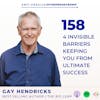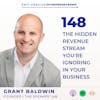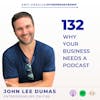6 Proven Ways to Find Your Flow State Every Day w/ Niyc Pidgeon

In this episode, Niyc Pidgeon and I are diving into how you can prioritize your own wellness and needs as a business owner. We’re going far beyond basic work-life balance tips and getting to the heart of true happiness as you learn how to practice mindfulness, find your “flow state” and flourish.
Are you struggling to prioritize your own wellness and needs in the midst of running your business day in and day out?
Are you ready to get out of overwhelm so you can finally experience true joy and fulfillment, even in times of chaos and stress?
If you want to know the secrets to finding your “flow state” every day so you can flourish as a visionary leader, today’s episode is for you.
BY THE TIME YOU FINISH LISTENING TO MY CONVERSATION WITH NIYC PIDGEON, YOU’LL DISCOVER:
- How to create structure and prioritize your needs and personal wellness as a business owner
- The 3 P’s for getting out of overwhelm, fast
- The science of happiness and how you can use it to your advantage
- The six pillars of flourishing — including practicing mindfulness — and how to find your “flow state” every day
- PLUS, how you can have the opportunity to grab a FREE copy of Niyc’s book, Now is Your Chance
_____________
Liked this episode? Pay it forward and share it with a friend.
Love the show? Write a 5-star review — even one sentence helps us keep bringing you the content you want to hear.
More from Courtney:
- Website: theeffortlesslife.co
- Instagram: @thecourtneyelmer
Some product links on this site are affiliate links, which means we'll earn a small commission for any affiliate purchases you make (at no additional cost to you). We only recommend products that we use and/or personally trust, so you can browse with confidence.
All Rights Reserved | © The EffortLESS Life®
00:00.00 Courtney Elmer
Niyc, welcome to the AntiFragile Entrepreneurship™ podcast! I'm excited for our conversation on wellness, work-life balance, and mindfulness today. It’s so needed right now.
00:07.18 Niyc Pidgeon
So excited to be here.
00:19.93 Courtney Elmer
So before we get into wellness, work-life balance, and mindfulness — I have to hear the story behind how you made Elon Musk cry. Let's start there because I feel there's a big story behind that and I'm so curious!
00:26.19 Niyc Pidgeon
Yeah for sure! It's crazy — back in 2013, I’d started my business in Newcastle, my hometown in the UK. I was trying to make it work and I actually got a loan from Sir Richard Branson’s company, Virgin Money, for the grand total of £8500 hundred pounds. But back then it was the biggest thing and I was so excited.
As part of being awarded that grant from Virgin Money, I was invited to take part in a Google hangout with Sir Richard Branson and Elon Musk as well. Imagine, two billionaires and little old me from Newcastle. I was invited to ask a question, but all of the questions that the production team gave me were terrible! They were so boring. So I smiled and agreed and went along with it, But then at the last minute decided to change the question and ask my own. So Elon came on screen and I was looking down the camera at him and I said, “Elon I'm a positive psychologist. And I'd love to know from you, “What would you say is the most emotional thing that you've ever had to do in business?”
He started to tell the story of when he was faced with investing in either SpaceX or in Tesla and he described the businesses like his children. And he said, “You don't want either one of your babies to die. So it was a very very tough decision for me.” The short version of the story is he decided to go all in — so he took all of the money that he had, literally all of it, to the point that he was staying on a friend's couch because he couldn't afford to pay rent. And he invested it in these two companies. He took a huge gamble on himself and of course we know that that paid off because Tesla and SpaceX are now thriving.
What I learned from that conversation was that even billionaires get scared and many don’t focus on wellness. We’re on this journey as entrepreneurs, and you never know what it's going to throw at you. At the time I was literally staring down the lens of a camera but I could see the production team behind him and I was trying to keep a straight face because I was looking down this lens speaking to a billionaire. And afterward, the production team said “Oh my gosh did you see what happened?!
Did you see what happened?!” I said no because I wasn't looking at him, I was looking at the lens. They said, “You made him cry. Let’s go back and watch it.” And sure enough, we watched it again and he was tearing up and he was visibly emotional during that conversation because it was something that he felt deeply and it was so important to him.
03:12.92 Courtney Elmer
Wow, what a moment. Business can be emotional for all of us truthfully! We do try to keep it separate, but we’re humans! We’re emotional beings. It’s natural when it comes to running a business and it is nice to know that billionaires are not excluded from that.
03:43.01 Niyc Pidgeon
Yeah a hundred percent.
03:48.76 Courtney Elmer
So our conversation today is about unpacking how to prioritize you as the visionary leader of your brand, wellness, work-life balance, and mindfulness. This is needed now more than ever, because for the past couple of years amid the pandemic and everything going on, life tends to feel like there is no structure because we don't know what's coming next. The moment we think we get into a rhythm or a routine, something else comes and knocks us off of our feet, and chances are those listening would agree.
You shared something on your Instagram a few weeks ago that I loved. You said, “When you're lacking direction or when you're feeling overwhelmed, always remember that structure is your friend.” I one hundred percent agree with you there and this is the number one thing that people tend to resist — creating structure for themselves when life feels chaotic. So for someone listening who is coming from that space right now where they feel like their life has no structure, where would you tell them to begin?
04:45.13 Niyc Pidgeon
It's such a good point. Overwhelm doesn't come from having too much to do, it comes from having too much unplanned to do, which can impact your wellness, work-life balance, and mindfulness. I'm the big visionary in our company — the crazy professor with all of the ideas.
I’ve had to learn by testing and experimenting throughout my life. I used to be the girl that lost her keys all of the time and would get all flustered to the point where I would cry, so I started to use the mantra: “As I hurry slowly, time expands for me.” That helped me: taking a breath, bringing presence into the picture, and getting into a place where you can start to reconnect with what it is you want to accomplish.
So I talk about 3 P's of getting out of overwhelm. First is Presence; the second is Purpose; the third is Plan--all of which help with your wellness.
First, Presence: Taking a minute to stop, and breathe.
Second, Purpose: Why do you want to do the thing that you do? What is driving you? What is motivating you? What is important and meaningful for you? Let's say I'm having a crazy busy day, I've got so much on my plate and I'm balancing it all-- which impacts my wellness, work-life balance, and mindfulness.
Somehow I'm making it work, and I bring myself back to that presence — those few breaths. Then I remind myself I'm here for a reason, I'm doing this for a reason. It brings me so much joy and fulfillment to be living on purpose and living on mission, where I'm helping millions of humans all around the world transform their lives and live with more joy and more personal power using positive psychology and coaching.
As soon as I remind myself of that, I've got all of the energy in the world. It helps to motivate you and keeps you going even when it feels hard or boring or scary.
And then the third P in this puzzle is making a Plan which helps with your wellness and work-life balance. So many of us forget to do this. When life is chaos, you need a plan to ground yourself. In my years of traveling and speaking, one of the things that grounded me was my quarterly plan. It can also be a personal plan for your wellness — like how when I was traveling, I’d always look for a gym and prioritize my workouts because of the structure and routine that brought me when I was out of my element or comfort zone.
07:32.24 Niyc Pidgeon
So I would plan ahead and I'd say okay where am I going I'm going to Miami for a week and let's look at what type of gyms and classes they have in Miami, and book something in. So as soon as I get into that new time zone, I've got something that grounds me into that news space. It’s important, not to think about “what can I plan in terms of business activities,” certainly that but also building in these intentional personal systems as well.
08:02.18 Courtney Elmer
Yes. Going back to the second P — I find that a lot of us as entrepreneurs, myself included, have a tendency to think my purpose always has to do with my business. But it doesn’t, as you said. It’s what grounds you personally as well. I've been doing that I call “joy journaling” — literally at the end of the day, jotting down what brought me joy that day. Sometimes I can get so in my head and in the motions of keeping up with all the things balancing everything that I forget I forget to stay connected to those things that bring me joy and that sense of purpose. I forget to focus on my wellness, work-life balance, and mindfulness.
08:52.59 Niyc Pidgeon
Yes, to that! That's literally positive psychology in action — you've brought me so much joy by saying that! It's so important for wellness.
08:59.43 Courtney Elmer
I have a background in psychology as well and this is why I was so excited to bring you on, because what you do between the intersection of positive psychology and entrepreneurship is so unique and valuable in ways. So can you walk us through how specifically positive psychology can have an impact on you as the visionary leader of your company, as the entrepreneur who is leading your vision and bringing it to life?
09:29.10 Niyc Pidgeon
I feel I'm very biased because positive psychology is life. I've been in this field for more than a decade, and when I started in positive psychology, everyone thought it was so strange. This was back in 2010. But I had this trusting and this knowing inside of me that this was the thing that was going to be my career.
I think about positive psychology like this amazing umbrella that goes over everything — with positive psychology, you have the ability to create positive relationships. You have the opportunity to grow your business and make more money. You have the opportunity to become healthier. You have the opportunity to become flourishing psychologically as well.
In positive psychology, we talk about the Pillars of Flourishing, following something called the “PERMAH Criteria.” This was a framework that was invented by the founder of positive psychology, Martin Seligman. He teaches that we need positive emotions, engagement, positive relationships, meaning, accomplishment, and health in order to thrive and flourish in life and in business, not just survive.
When people are feeling better, improving their wellness, and when they have a greater sense of psychological well being, that extends outwards in a ripple effect. There's been some new research done recently that we found through our positive psychology coach certification and they've looked at the impact of two people working together, whether it's in a coaching relationship or let's say you go and learn about positive psychology and you talk to a friend about it. There's a ripple effect that extends out further and wider.
We use positive psychology across the board. We use it in sales conversations to support our clients to make buying decisions more easily. We use it in our coaching programs to help our clients get better results. We use it in conversations at dinner parties to help everyone have a better time.
It does filter through everything and you'll notice, yes, it's a science. It's proven and it's evidence based, but it's also things that your grandmother told you and it's things that you've perhaps heard time and time again. Positive psychology tells you why. It tells you how. It tells you what to do exactly to find happiness and fulfillment. That's what people are grasping for right now. They're looking for certainty. They’re looking to feel grounded again amongst all of the change. Positive psychology provides that.
13:33.31 Courtney Elmer
Even though my focus is on teaching business systems, psychology undergirds it in so many ways. I read a book recently called the Happiness Hypothesis by Jonathan Haidt. In the book he quotes Martin Seligman a lot and he's talking about these pillars. So for our listeners who maybe have heard about positive psychology but they're unclear as to what it is specifically, would you give us a simple definition of what positive psychology is, and then I would love to dive into those six pillars with you.
14:14.11 Niyc Pidgeon
For sure. So PosPsych as we call it, is the science of how individuals, communities and businesses thrive. It's the science of happiness and success. It was invented as a counterbalance to traditional psychology which can tend to focus more on dis-order and dis-ease. Instead of trying to unpack what went wrong, positive psychology looks instead at human strength and virtue. It looks at what goes right and what people’s potential, opportunities, and possibilities are instead.
14:50.37 Courtney Elmer
This is what makes it so fascinating, because still to this day when people think about the field of psychology, it is more of that traditional disease model. It's to treat or fix problems. But I love this new movement that’s refreshed the face of psychology by focusing on what you're good at — your gifts, your strengths, your virtues, and on cultivating that. So what are these six pillars of flourishing, wellness, work-life balance, and mindfulness? Could you walk us through each one of those and give us one tangible takeaway so if someone listening was to walk away from this episode, today, they’d have a clear plan on how to work on Pillar 1, Pillar 2, etc. in their life?
15:39.56 Niyc Pidgeon
Okay, so Pillar Number 1: Positive Emotions
The distinction to know about positive emotions is that in science and research we found that for every negative emotion or thought or feeling that we have, we actually need three or more positives to outweigh the negatives. The negatives tend to be stronger and last longer. For example when you're in a marriage or a relationship, you actually need five positive emotions to outweigh every one negative. So think about the conversations that you're having or the emotions that you're having in your relationships, in your life, and your business and you can see very clearly where some of us might be going wrong and that balance might be a little bit out of tilt.
So in the science of positive psychology the pillar of Positive Emotions has a million different interventions. There's so much that you can do to counteract this! You actually mentioned one at the start of this show Courtney, you mentioned making a joy list. So a joy list or a done list. That's a powerful simple exercise.
You can use it to help you remember and be mindful of everything that is good. Similarly, there is a proven gratitude intervention called “3 Good Things” which I love to use when I'm waiting in line at the supermarket or in the doctor's office — those moments where frustration might creep in. I stop and consider, what are you grateful for? It brings you back into a very present place where we know that gratitude is something that can boost those positive emotions and help us to flourish and thrive, and improve our wellness, work-life balance, and mindfulness.
The positive emotions that we're talking about are things amusement and love and excitement and joy and gratitude and serenity. There are about 10 positive emotions that we work with and as I said before, we want to make sure that we're taking care of that positivity ratio as well as boosting the positive emotions. We're making sure that we reduce the negative as well because remember the negative is stronger.
18:21.20 Niyc Pidgeon
Pillar 2 of the PERMAH Criteria is Engagement.
The E is for engagement—this is about considering what it is you're good at.
What is it that you love to engage with? So a powerful and simple tool that you can use is to cast your mind back to a time where you felt you were completely in flow. Think of a time where you were loving the activity that you were participating in. Time went by unnoticed.
Whatever you were working on was challenging enough so that you were interested and connected, where it wasn’t boring for you but also not so hard it made you want to quit. So if something might have sprung to mind right now, then I want you to consider what was that particular flow experience that felt so good? This is to help you understand what your strengths and your superpowers are. It can also help you to uncover some of your values and some of the things that are important for you. It's a powerful exercise to get you connected with strengths and into flow.
20:21.20 Niyc Pidgeon
Pillar 3 of the PERMAH Criteria is positive relationships to improve our wellness, work-life balance, and mindfulness. A Simple that’s actually included in my book for positive relationships is this: You've probably heard the saying before that “It's not about what happens to you or it's not about what people say to you, it's about how you respond to it.” That's great conceptually, and there's a positive psychology intervention to support it.
So the next time someone in your life comes to you and tells you something that's been going on in their life and tells you, “Oh my goodness, Niyc I'm so happy about this thing — I've got a new job or I've got a new girlfriend or boyfriend.” Be mindful of how you respond to that share. You might notice yourself saying, “Oh well, my day's been terrible my and I can't believe you're having such a good time because I'm not, that sucks.” You're almost ignoring what the person said and you're dismissing it and you're refocusing on yourself.
The correct or the positive psychology way of responding is doing something called “Active-Constructive Responding.” This means first of all to acknowledge what they said — ”Wow thank you so much for sharing that with me, that’s amazing congratulations.” It’s taking the time in the presence to be with that person in the share and in the celebration of it. Then secondly, asking a question about it like, “Tell me, what was the most exciting thing about that?” Or, “What are your next steps?” How can we work on wellness, work-life balance, and mindfulness?
By doing this you’re allowing that person to enjoy the experience and enjoy the share. That’s going to support and deepen your relationships. Try it for a week and see how your relationships change as well as your wellness, work-life balance, and mindfulness.
21:03.18 Niyc Pidgeon
Next up is Meaning. This is about what we talked about before when we talked about purpose, the second P. There's a tool that you can use for this which is to consider yourself at the end of your life — what would you love for people to be saying about you? What is it that would feel on purpose for you? What do you want to be remembered for? It's going to give you an indicator of the type of legacy you would like to lead and leave. Then it’s going to help you to see, “Okay, am I living life on purpose right now? What might be a positive step in that direction to help me get closer to that?” It's very motivating when you get connected with your meaning.
23:05:14 Niyc Pidgeon
The A in the PERMAH criteria is for Accomplishment.
You might have heard Tony Robbins say before, “If you're not growing, you’re dying.” Accomplishment is all about this as humans. We love to grow. We love to have a sense of progress and know that we're moving forwards with things. So a sense of accomplishment might come from something simple like you did your joy list. You might do a “ten awesome things about me” list and lists are powerful and simple.
Ten awesome things about me could include, for example, one young entrepreneur feature of me back in 2015 that I’m proud of. It might also include me being an Aunt to my niece Olivia and my nephew Alphie which I feel proud of. Write your list and then save it on your desktop. Anytime you have a little wobble and things get hard or they’re not going well, you'll be reminded of how accomplished you already are.
Finally the H at the end of the PERMAHH Criteria is for health. Being able to feel good, enhance your wellness, work-life balance, and mindfulness, being able to have a good sleep, being able to do things in your day that are restorative for your energy and your well-being. Eating well, moving well. An intervention or a tool that you can use is doing a snapshot again of where you're at right now to give yourself an honest picture of where you might have some room for growth here. Remember, positive psychology takes you from where you're to where you want to be.
23:48.34 Niyc Pidgeon
So I want you to rate yourself on sleep, restoration, movement, and nutrition on a scale of 1 to 10--your overall wellness, work-life balance, and mindfulness. So 1 being absolutely terrible, everything's going wrong; 10 out of 10 being nothing could be better. Then you've got an accurate picture of where you're at and then you can ask the question again, “What might be one next positive step in the direction to get me towards being a ten?”
24:11.53 Courtney Elmer
Can we drop the mic right there? This is so practical and that’s what I love about what you just shared. When you hear the term positive psychology, or even psychology in general, it’s hard to know how to apply it.
How do I utilize it? People gloss over it because they don't know what it is. I know there's so much more to positive psychology than even what you shared, but what you shared is so practical. It’s so simple. It’s the little things that we don't often make the time for, but in reviewing this short list here of the different interventions and tools that you shared, they're not time consuming. They don't take up a lot of time from your day — I mean standing in line at the grocery store and focusing on what are 3 things I'm grateful for right now is so doable. When someone shares something exciting with you, simply remember to ask them a question about it to keep that feeling alive. It doesn’t take a whole lot of effort or energy to do it's these simple little tweaks that can help get us out of overwhelm and back on the path toward feeling fulfilled and feeling that purpose in our life.
What I’d love to hear from you Niyc is there anything else that you would like to share for someone listening right now who might be sitting here nodding their head going, “Yeah, this is great. I would love to do this but my life feels too chaotic right now to even give any time to this.” Or maybe quite frankly, they feel too burnt out to even have any energy. Where should they start? How can they improve their wellness, work-life balance, and mindfulness?
26:20.78 Niyc Pidgeon
It's a great point that you make. Positive psychology or working on yourself or mindset can feel hard. It can feel like a mountain to climb and there's so much power that we have to change the way that we feel in a single moment. Someone had a journalist do an article with me for a magazine and she asked me she said Niyc, you've got this book which is a thirty day guide to living a happiest life. Do you actually think it's possible to change your mindset in a month? It made me laugh because once you get started with positive psychology, you’ll see. It's possible to change your mindset in a moment.
That's the thing that is important for everybody listening to take away. It doesn't have to be hard. These things are simple. You simply have to start. What happens is over time when you're taking the positive daily steps and you do in these micro shifts, you're intentionally stacking positive habits. You have this snowball effect, this point of critical mass where you get momentum and then you start to feel good every single day. My invitation for you is to start with something simple, start with something, maybe something from the show. Take one thing and start to do it consistently and you'll see how your life completely transforms.
27:43.61 Courtney Elmer
Tell us more about your book because it sounds amazing and I know our listeners would probably love to read it.
28:12.19 Niyc Pidgeon
I'll share the link with you because we actually gave the book away for free. You just pay the shipping, so you can simply click the link and go grab your copy. It is literally a toolbook — it got dubbed the Bible for happiness and I thought, that is so cool! What it does is gives you a roadmap to make positive psychology a lifestyle and add to your wellness, work-life balance, and mindfulness. I said it earlier, positive psychology is my life. It’s a lifestyle. It’s something that once you learn, you’re never going to unlearn it. You live by it and you love it and it's energy-giving. So if anyone listening is struggling, this is the thing that is gonna give you the lift.
29:31.91 Courtney Elmer
Yes, we will absolutely link to it in the show notes because the Bible of happiness what? What a great testament, no pun intended there, to what you've written and to what you have created. It gets to be simple.
So often we forget that when life gets crazy but you get to choose. You get to choose. So Niyc there's a final question that I ask every guest who comes on the show and there've never been 2 answers that have been alike.
30:06.80 Courtney Elmer
I would love to hear, what does it mean to you to live an EffortLESS Life® ?
30:19.63 Niyc Pidgeon
For me, an EffortLESS Life® feels like being in peace within yourself as much as possible throughout your day. As I've grown older, it’s become more important for me to be in personal peace and to have practices and to have things that I do in my day that allow me to be calm within the storm that's going on outside. It's about getting into those states of flow and presence and maintaining that personal peace and improving my wellness, work-life balance, and mindfulness.
30:59.69 Courtney Elmer
That's beautiful. This has been a powerful conversation and I know that for those listening who feel overwhelmed, I hope that you got at least one takeaway. One tangible thing that spoke to you. Go take action on it. Go out there and start practicing it and watch what happens. Watch what happens. Niyc where can people find you online and connect with you to learn more from you to learn more about wellness, work-life balance, and mindfulness?
31:26.59 Niyc Pidgeon
So niycpidgeon.com is the website and I love hanging out on Instagram. I'm a huge fan of voice notes. So Instagram @niycpidge on there.
31:35.60 Courtney Elmer
Love it. We will absolutely link to all of that. Niyc, thank you so much for your time today to talk about wellness, work-life balance, and mindfulness, and for being here this was great.
31:40.68 Niyc Pidgeon
Thank you so much. I appreciate you.

Niyc Pidgeon
CEO, Award-Winning Best-Selling Hay House Author, and Certified High Performance & Success Coach
Known as 'The Girl Who Made Elon Musk Cry', Niyc Pidgeon is a leader with a high level network of clients and business friends, Niyc supports coaches to grow 6 & 7- figure Coaching Businesses Online and her clients have generated over $22 million dollars in the last five years.
Niyc is a best selling Hay House author, award winning positive psychologist, twice certified high performance coach, and investor. She is founder of the multi million dollar brand Unstoppable Success, creator of The Positive Psychology Coach Academy Certification, and her mission is to help millions of people change their lives through positive psychology and entrepreneurship.
As “Most Outstanding Positive Psychologist 2018” MSc BSc CTLLS IPPA, Award-Winning Best-Selling Hay House Author “Now Is Your Chance”, International Speaker, and Certified High Performance & Success Coach CHPC, Niyc has more than a decade of experience in helping women create massive breakthroughs and lasting positive change in life and business.
"If you haven’t read her book you have to read it - life transforming! And if you have the chance to work with her directly - get involved, because she is one of those leaders in our
industry who is truly truly helping people transform the quality of their lives."
– Brendon Burchard, New York Times Best Selling Author, Top 25 Most Influential Leaders in Personal Growth and Achievement, Top 100 Most Followed Public Figure in the World.








